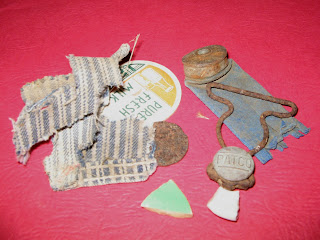


The preceding evidence bag turned out, after it had lain on the floor of my car for a couple of weeks, to be a useful vessel for holding evidence of another sort, namely the bits and bobs of archaeological scraps I found at an abandoned homestead 10 miles south of Boise City, Oklahoma (pictured above, along with the house and an archival photo of a dust-storm).
I recently read Timothy Egan's book The Worst Hard Time and, having found it to be an extraordinarily good book—and being otherwise unoccupied—decided to hop into the car and motor up into the terrain where the Dust Bowl did its worst. See, Egan's book told the true stories of those (and they were a majority) who stayed behind during the Dust Bowl years. Steinbeck's Joads, in the Grapes of Wrath, represented a minority.
The drive was lovely and austere, with its unremitting flatness and distant horizons. Yet I knew it was different from the view afforded in the 1930s, when it was largely dust dunes. Much of the grassland had been restored, thanks largely to Hugh H. Bennett, who strove mightily during the decade-long drought to right the wrongs that American hubris had inflicted on the Great Plains.
























